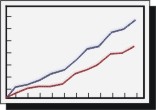| Gary Foreman is a former Certified Financial Planner (CFP) who currently writes
about family finances and edits
The Dollar Stretcher website
http://www.stretcher.com. You'll find hundreds of FREE
articles to stretch your day and your budget! |

Dear
Gary,
My husband and I want to refinance our mortgage and add a credit
card debt. We owe $44,000 on our mortgage at a rate of 7 1/8% and we
have 11 years left. We want to add a credit card debt of $17,000 at
a rate of 9.99%. The best mortgage rate that I have been able to
find is a 15 year fixed at 6.25% with a fee of $1161 and no points.
Would we be wise to refinance? Thanks. I hope you can help me with
the answer or point me in the right direction. --Lynn O.
You don't need to be refinancing your
home to ask this question. We face the same problem with competing
credit card or auto financing offers. And many of us have a similar
reaction. There's just too many numbers to even know where to start.
So we end up with something that could be costing us extra money
every month.
Let's break Lynn's question down into
bite sized pieces and see if we can't simplify things. We'll look at
a method that you can use to compare any two loans.
 First we'll figure out what Lynn is
paying in interest each month on her current mortgage and credit
card balance. Then we'll calculate what the new loan would cost her
in interest. Then we'll compare the two and see how long it would
take to recover the fee. First we'll figure out what Lynn is
paying in interest each month on her current mortgage and credit
card balance. Then we'll calculate what the new loan would cost her
in interest. Then we'll compare the two and see how long it would
take to recover the fee.
Begin with the existing mortgage.
Lynn has a $44,000 mortgage at 7.12%. We'll do a monthly comparison.
If we take the annual interest rate (7.12%) and divide it by 12
we'll find out what the rate is each month. It works out to 0.59%.
To calculate how many dollars that equals to each month we'll
multiply the mortgage principal amount ($44,000) by the percent
interest (.59% or .0059). It works out to $260 in interest charges.
Now for Lynn's current credit cards.
She has a balance of $17,000 and is paying 9.99% interest. The
process is the same as for the mortgage. We're going to take the
annual interest and convert it to a monthly rate. In this case
that's 0.83%. Then we'll multiply the balance by the rate ($17,000 x
0.0083) to get the monthly interest owed ($141).
So, between the two bills she's
paying $401 ($260 + $141) each month in interest payments.
How would a new mortgage stack up?
Well, since she wants to add the credit card debt to the existing
mortgage, the refinanced mortgage would be $61,000 ($44,000 +
$17,000).
Now that we know the principal, let's
calculate the monthly interest. Again we'll take the annual rate
(6.25%) and divide by 12 to get the monthly rate (0.52%). Then we'll
multiply the mortgage balance by the monthly rate ($61,000 x 0.0052)
to get our monthly interest amount ($317).
Now we're in a position to compare
how much the two loans would cost. The new rate would save her $84
each month in interest ($401 - $317).
But, as Lynn pointed out, there's a
fee of $1,161. Is it worth paying that fee to get the monthly
savings? If we divide the fee by the monthly savings we'll see that
it would take nearly 14 months for Lynn to save enough to recover
the fee.
 Now I'm sure that those of you who
are good with math have probably found a few flaws in our method.
The main problem is that all three balances will change a little
each month. So to be perfectly accurate we'd need to do a separate
calculation for each month. And then adjust our account balances and
do it all over again. And again, etc. Now I'm sure that those of you who
are good with math have probably found a few flaws in our method.
The main problem is that all three balances will change a little
each month. So to be perfectly accurate we'd need to do a separate
calculation for each month. And then adjust our account balances and
do it all over again. And again, etc.
But that really shouldn't be
necessary. Predicting the future isn't an exact science. So even if
our calculations were precise, the future wouldn't be. This method
will give Lynn a pretty fair estimate. Certainly good enough to make
a decision.
There are other things to consider.
Payments may be different than the amount of interest owed. The new
interest owed each month is like money that Lynn has spent. In this
case she bought some borrowed money. Her payment would typically be
the amount of new interest plus some of the principal amount owed.
She doesn't want to confuse the two and sign up for a payment that
she can't afford.
Also, rolling credit card debts into
your home mortgage isn't always a good idea. There can be a
temptation when you see an account balance of zero. Many people will
run up the balance again. And that would defeat the purpose of
putting the credit card balance in with the mortgage.
From this point Lynn should be able
to compare the two choices and make a reasonable decision for her
family. We hope it's a good one for her family.
--End--
| 